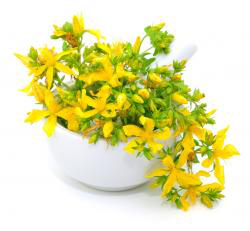Description
Botanical: Hypericum perforatum
Other common names: Goatweed, Hypericum, Amber, Witches' Wort, Klamath Weed,
St. Joan's Wort, Common St. John's Wort, Tipton's Weed, God's Wonder Plant
St. John's Wort is powerful natural medicine for temporary depression. It has become the world's most popular calming herbal supplement for banishing the blues and controlling stress and has also been used to calm the digestive tract, treat chronic fatigue syndrome, anxiety, menopausal mood swings and a host of other ailments.
Country of Origin: Bulgaria
Beneficial Uses:
The most common and popular use of St. John's Wort is for the treatment of temporary depression, although the exact way it works is not entirely clear. Some tests have revealed the ingredient, hypericin, to be an antidepressant, and further systematic exploration into the clinical and pharmacological effects of St. John's Wort indicate that the chemical, hyperforin, works as a monoamine oxidase (MAO) inhibitor.
Because St. John's Wort appears to be able to fight temporary depression, this quality also makes it useful in treating Chronic Fatigue Syndrome and the mood swings associated with menopause and PMS. It is also considered a mild sedative and when used in the treatment of insomnia, St. John's Wort does not actually increase the total sleeping time but may increase the time spent in deep sleep by helping to produce melatonin, a sleep-regulating hormone.
St. John's Wort is believed to be good for nerve pain and is sometimes used to improve the long-term nerve damage caused by uncontrolled diabetes. This herb's ability to help the median nerve in the wrist facilitated pain relief in some carpal tunnel syndrome tests.
St. John's Wort is an effective antiseptic and when used topically, it helps to heal wounds, prevents skin infection, and keeps open wounds from becoming infected. The essential oil is strongly antibacterial (even more so than sulfa drugs) and counteracts staph infection.
St. John's Wort is an antiviral and anti-inflammatory and has been beneficially used for herpes virus, cold sores, shingles and fever blisters. The antiviral process triggered by St. John's Wort appears to be enhanced when the user is exposed to sunlight. This same activity applies when the herb is used topically for vitiligo, and beneficial results are favorably affected by exposure to sunlight.
St. John's Wort is said to possess calming effects on the digestive system and is believed to be effective in treating Crohn's disease, Irritable Bowel Syndrome (IBS) and a variety of digestive ailments. St. John's Wort is a bittersweet, astringent herb and an anti-inflammatory that helps to promote healing, reduce inflammation and swelling and may help to relieve hemorrhoids.
Contraindications:
There are many warnings associated with the use of St. John's Wort, as it may have potentially dangerous interactions with prescription drugs, and one should always consult a physician when taking prescription medication of any sort before using this herb. Pregnant women should avoid this product, and those who are photosensitive to light may experience an allergic reaction when exposed to sunlight or may become sunburned. Some people may experience stomach upset, restlessness, mild allergic reactions or fatigue when using this herb.


